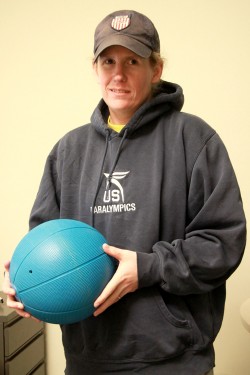With the London Olympics in full swing, many people may not be thinking about what comes next: London’s 2012 Paralympic Games.
Defending the gold
With the London Olympics in full swing, many people may not be thinking about what comes next: London’s 2012 Paralympic Games.
But for Portland State’s Jen Armbruster, things are different. Armbruster, who works in the Academic and Student Rec Center as an inclusive recreation and community service coordinator, will be participating in her sixth Paralympic Games as a goalball athlete after winning a gold medal in Beijing.

Armbruster’s perspective on the games has changed over the years.
“You know, it’s number six, and not to say ‘Wow, how do you top a gold?’ but the only way is to get a double gold,” she said. “But I’m most excited, obviously, to see the competition, because that’s what the six of us are there for.”
Growing up in a military family, Armbruster played many sports. Basketball was her favorite, and her goal was to play in college, then go on to the Olympics and eventually join the military.
But when she was 14, her optic nerve began to fail, causing her vision to become impaired. It happened out of the blue, and doctors never found the cause. By 17, she was completely blind.
As a legally blind girl playing competitive basketball, Armbruster drew attention from the local press and was soon asked to consider playing goalball. “Yeah, okay! It says ball, sure,” she responded.
But really, aside from the fact that it’s played on a wooden court, goalball is nothing like basketball. It’s a game for the visually impaired, and since everyone has different levels of vision, blindfolds ensure fairness. The court is the size of a volleyball court and is set up with lines that have strings under them so players can feel where they are.
The ball is a 3-pound medicine ball, but with no air pressure and filled with bells so players can hear it coming. Teams take turns throwing the ball underhand or sidearm down the court at about 35 miles per hour, and the other team defends by diving to the ground to protect the goal.
“Defensively you’re playing on your end, and essentially, you’re three soccer goalies,” Armbruster said.
By 1992 Armbruster was competing in her first Paralympic Games in Barcelona. She went on to get a bronze medal in 1996 in Atlanta, then a silver in Athens. In the 2008 Beijing games, Armbruster was the flagbearer for the U.S. and her team went on to win the gold.
The team consists of six people, four of whom have been together since Beijing. Armbruster’s father, Ken Armbruster, has been the coach since the 1996 games. He’s also been Armbruster’s coach since she lost her vision.
“We learned it together a lot of times, and people always say that we share the same brain on the court and off the court,” Ken Armbruster said. “She thinks a lot like I do and I guess that’s probably one of the pleasures, too.”
For Asya Miller, Armbruster’s wife and teammate, this will be trip number four to the Paralympics. “We’re excited. There’s a lot more pressure to defend a gold than to win a gold the first time,” Miller said.
For the two new players, who are 18 and 22 years old, everything is new. The games they play in competitions around the states are nothing like playing in front of the thousands of people at the Paralympic games.
“My focus right now is to get those two rookies their first gold medals; one for one isn’t that bad,” Armbruster said. “I’m really excited to see those two young ones go through the whole process.”
On Aug. 14, from 4 to 5 p.m., PSU will host a Paralympic send-off in the Rec Center lobby. Aside from Armbruster and Miller, many other local community members will be recognized: Sean O’Neill, U.S. Paralympic table tennis head coach and former Olympic athlete; Seth McBride and Will Groulx, members of the wheelchair rugby team that won gold in Beijing; and wheelchair rugby coach Ed Suhr.
The 2012 London Paralympics will begin Aug. 29, and the first goalball game is scheduled for the next day. There will be a game each day until the final on Sept. 7.





